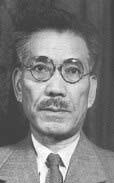
Toshio Shiratori
Encyclopedia

Japan
Japan is an island nation in East Asia. Located in the Pacific Ocean, it lies to the east of the Sea of Japan, China, North Korea, South Korea and Russia, stretching from the Sea of Okhotsk in the north to the East China Sea and Taiwan in the south...
ese ambassador
Ambassador
An ambassador is the highest ranking diplomat who represents a nation and is usually accredited to a foreign sovereign or government, or to an international organization....
to Italy
Italy
Italy , officially the Italian Republic languages]] under the European Charter for Regional or Minority Languages. In each of these, Italy's official name is as follows:;;;;;;;;), is a unitary parliamentary republic in South-Central Europe. To the north it borders France, Switzerland, Austria and...
from 1938 to 1940, advisor to the Japanese foreign minister
Foreign minister
A Minister of Foreign Affairs, or foreign minister, is a cabinet minister who helps form the foreign policy of a sovereign state. The foreign minister is often regarded as the most senior ministerial position below that of the head of government . It is often granted to the deputy prime minister in...
in 1940, and one of the 14 Class-A war criminals enshrined at Yasukuni.
He served as Director of Information Bureau under the Foreign Ministry from 1929 to 1933. Served as Ambassador to Sweden and non-resident Ambassador to Finland from 1933 to 1936. He was appointed ambassador to Italy
Italy
Italy , officially the Italian Republic languages]] under the European Charter for Regional or Minority Languages. In each of these, Italy's official name is as follows:;;;;;;;;), is a unitary parliamentary republic in South-Central Europe. To the north it borders France, Switzerland, Austria and...
, serving from 1938 to 1940, and became adviser to the foreign minister in 1940. He was an advocate of military expansionism, counseling an alliance between Nazi Germany
Nazi Germany
Nazi Germany , also known as the Third Reich , but officially called German Reich from 1933 to 1943 and Greater German Reich from 26 June 1943 onward, is the name commonly used to refer to the state of Germany from 1933 to 1945, when it was a totalitarian dictatorship ruled by...
, Italy and Japan to facilitate world domination.
The International Military Tribunal for the Far East
International Military Tribunal for the Far East
The International Military Tribunal for the Far East , also known as the Tokyo Trials, the Tokyo War Crimes Tribunal, or simply the Tribunal, was convened on April 29, 1946, to try the leaders of the Empire of Japan for three types of crimes: "Class A" crimes were reserved for those who...
found him guilty of aggression. He was sentenced to imprisonment for life for waging wars of aggression. He died in prison.
He was one of the fourteen Class-A
Crime against peace
A crime against peace, in international law, refers to "planning, preparation, initiation, or waging of wars of aggression, or a war in violation of international treaties, agreements or assurances, or participation in a common plan or conspiracy for the accomplishment of any of the foregoing"...
war criminals controversially enshrined at Yasukuni Shrine in 1978. A memo from Emperor Hirohito
Hirohito
, posthumously in Japan officially called Emperor Shōwa or , was the 124th Emperor of Japan according to the traditional order, reigning from December 25, 1926, until his death in 1989. Although better known outside of Japan by his personal name Hirohito, in Japan he is now referred to...
, disclosed in 2006, revealed that he stopped visiting Yasukuni Shrine
Yasukuni Shrine
is a Shinto shrine located in Chiyoda, Tokyo, Japan. It is dedicated to the soldiers and others who died fighting on behalf of the Emperor of Japan. Currently, its Symbolic Registry of Divinities lists the names of over 2,466,000 enshrined men and women whose lives were dedicated to the service of...
because of the enrollment of the war criminals, stating "they even enshrined Matsuoka
Yosuke Matsuoka
was a diplomat and Minister of Foreign Affairs of the Empire of Japan during the early stages of World War II. He is best known for his defiant speech at the League of Nations in 1933, ending Japan’s participation in that organization...
and Shiratori".

